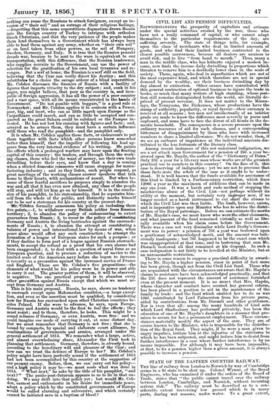CIVIL LIST AND PENSION DIFFICULTIES.
NOTWITHSTANDING the prosperity of capitalists and artisans under the special activities created by the war, those who
have not a ready command of capital; or who cannot adapt themselves to the particular requirements of the day, are suffering severely. The state of things tells, for example, upon the class of merchants who deal in limited amounts of goods, and who find their limited business contracted to the closest possible narrowness because all dealers are anxious to
avoid risk, and to live "from hand to mouth." Thus, many a
man in the middle class, who has hitherto enjoyed a modest in- come, now finds the income daily dwindling to proportions which threaten to remove him to a decidedly lower class in the scale of society. Those, again who deal in superfluities which are not of the most expensive kind, and, which therefore are not in special demand by the wealthy, see their business dwindling day by day almost to extinction. Other causes have contributed with this general contraction of optional business to injure the trade in books so much that many writers of high standing, whose posi- tion ;till remains distinguished before the world, are literally de- prived of present revenue. It does not matter to the Macau- lays the Tennysons, the Dickenses, whose productions have the stamp of authority, popularity, or royal favour—their currency is received at all seasons ; but men not intellectually of an inferior grade are made to know the difference most severely in purse and cupboard, and some have to face the direst of all fiends in the do- mestic household. The consequence is a severe pressure upon the
ordinary resources of aid for such classes, and a correspontling bitterness of disappointment by those who have with increased numbers to share a limited allowance. We do not wonder, then, if we see an outburst of impatience at the individual amounts dis- tributed to the less fortunate of the literary class.
Among recent instances of this not unnatural indignation, we see a set attack upon Government for a pension of 251. a year be- stowed upon Mr. Haydn, the author of the "Dictionary of Dates." Only 25/. a year for a literary man whose works are of the greatest practical use to numbers in this country ! On the face of it, this case is deserving of indignation : yet we are not to presume that those facts state the whole of the ease as it ought to be under- stood. It is well known that the funds available for assistance of this kind is limited by a Parliamentary restriction, which fixes 1200/. a year as the maximum of additions that can be made in. any one year. It was a harsh and rude method of stopping the mischievous abuse of the Civil List—not perhaps without its utility at the moment, but certainly very improper now-, if no longer needed as a harsh instrument to cut short the abuses to which the Civil List was then liable. The limit, however, exists, and is imperative upon any Minister who has to advise the distri- bution of the Royal patronage. Before we can estimate the merits of Mr. Haydn's case, we must know who were the other claimants, and what amount of the fund remained virtually as well as lite- rally available when his claim came before the Government.
There was a case not very dissimilar while Lord Derby's Govern- ment was in power: a pension of 701. a year was bestowed upon a gentleman of acknowledged merit, and the amount was ludi- crously inadequate ; but 701. happened to be the exact sum which was unappropriated at that time, and in bestowing that sum Mr. Disraeli bestowed all that remained at his disposal. In such a case indignation is not fairly to be levelled at the Minister, but at an unreasonable restriction.
There is some reason to suppose a practieal difficulty in award- ing to Mr. Haydn a higher pension, since in point of fact more has been given, though not from the Civil List fund. Those who are acquainted with the circumstances are aware that Mr. Haydn's claims to assistance have been acknowledged practically, and that the 25/. does not represent the amount of assistance furnished even at the present moment. It is no secret that Mrs. Haydn, whose character and conduct have secured her general esteem, has been placed in a position to aid in the maintenance of the family by trade : and the fund which enabled her to do so was 100/. contributed by Lord Palmerston from his private purse, aided by contributions from Mr. Disraeli and other gentlemen. Nor is even that all : among the many hundreds of kind acts which Lord Shaftesbury has performed privately, has been the education of one of Mr. Haydn's daughters in a manner that pro- mises to secure for her a permanent employment. These circum- stances materially modify the aspect of the case. They are of course known to the Minister, who is responsible for the distribu- tion of the Royal fund. They might., if he were a man given to angry impulses, irritate him at the injustice of the strictures to which he has been subjected, and might induce him to desist from further interference in a case where further interference is by no means impossible. For although it may have been impossible, at first, to fix a pension higher than a. given amount, it is always possible to increase a pension.


























 Previous page
Previous page